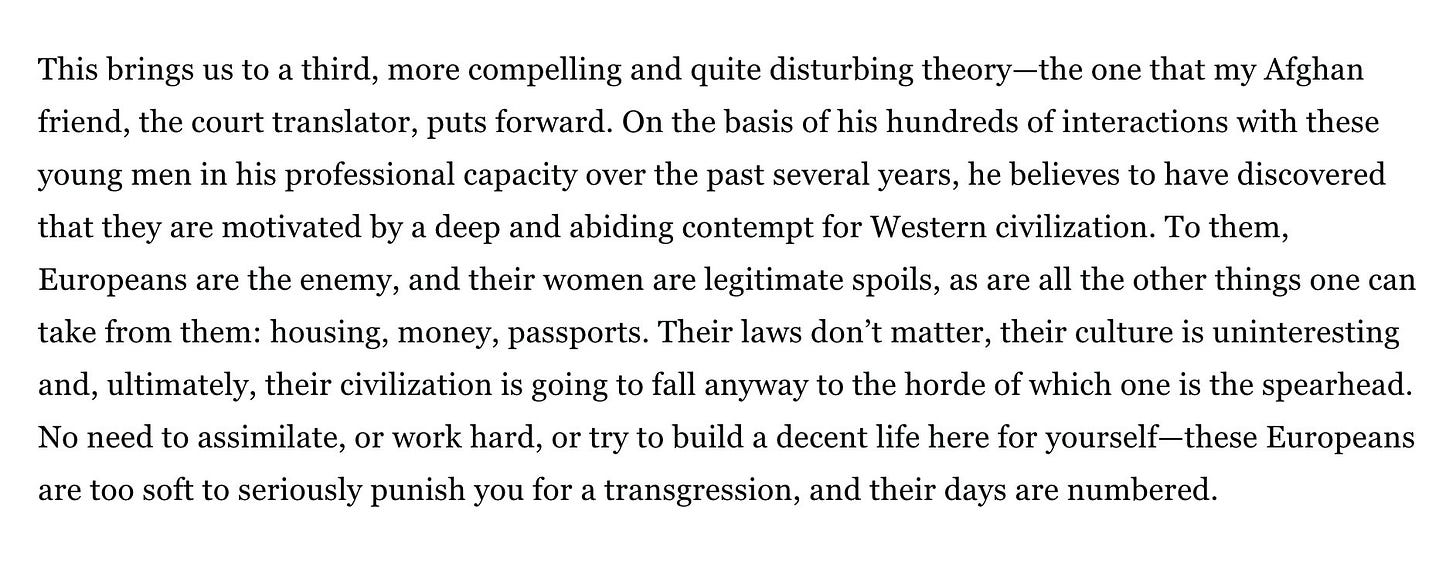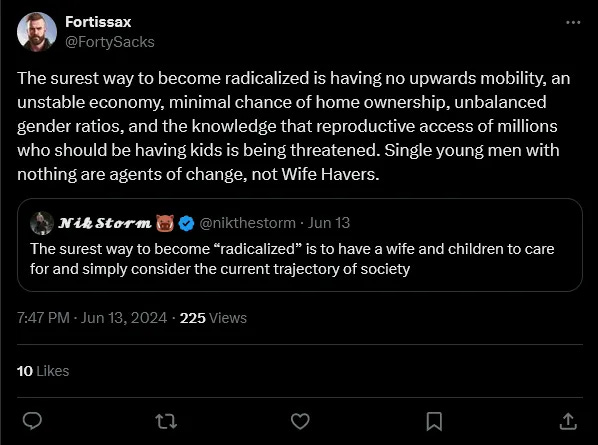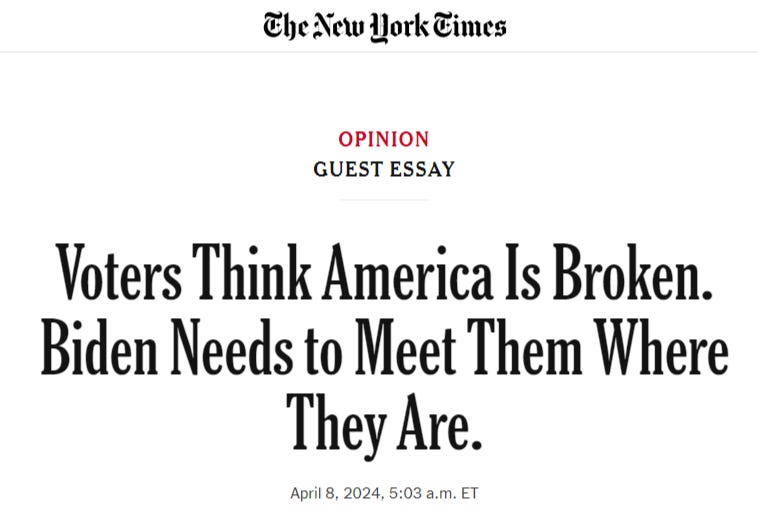The Hoi Polloi Are Sick
Thanks to Saint Jimmy (Russian American) for recommending this article...
As things dwindle down to the wire, and the country is plunged into historic political divisions pitting one extreme against other, we’re dragged along in a frenzy of misdirected aggression. Paralyzed by limbic hijack, we resort to an imitation of each other’s motions—the wisdom of the crowds replaced with a teeming madness.
One of the simplistic ideals we’ve adopted in the heat of struggle is that the government is solely the problem, and that as long as we can uproot the worst of the klepto- and kakistocrats—those entrenched deepstate fungi wracking the nation’s liverspotted trunk—the country will be freed, to blossom anew like a springtime meadow. The ‘System’ as culprit: always the same faceless, nameless System, or its shadow twin of ‘the Man’—as long as we can dethrone them, victory is guaranteed, and America will be free.
But in those hallucinatory throes we ignore the increasingly larger plight: it’s not just the system that is rotten, it is society itself.
The Hoi Polloi Are Sick
Now you can argue that the system is responsible for society’s ailments. It’s true that the various imposed oppressions from the government and rentier class—via their social engineering projects—have created, or at least exacerbated, every fundamental social ill now spitting up like pus from a boil.
For many decades the elites have pitted us against each other to deflect our rage from its rightful target. But even recognizing this, the fact remains that this longstanding culture-destruction has warped society into such a toxic swirling drain that even defeating the Leviathan would not cure our ills, nor hasten any form of social restitution. The problem is not just the red herring of ‘evil government’, but that culture is intrinsically tied with governance by the link of civic virtue—and civic virtue has died because our culture has been poisoned beyond rehabilitation. Even if you were to clear the slate of techno- and bureaucracy you’d be left with the stupefied degenerate masses too gormless to be ruled justly and virtuously.
A new piece by Charles Hugh Smith addresses precisely this. He explores the concept of a ‘common good’ as key arbiter of health in society.
The single-minded pursuit of greed does not magically organize the economy or society to serve everyone's interests equally. As Adam Smith explained, capitalism and the social order both require a moral foundation, which in a free society takes the form of civic virtue: it is the responsibility of every citizen who is able to contribute to the social capital that serves us all to do so not in response to an oppressive state but of their own free will.
A functioning society requires a moral foundation stitched from the delicate fabric of civic virtue. But civic virtue is, unfortunately, quite susceptible to deterioration, if it is not constantly watered and rejuvenated, or minded by a careful caretaker.
The Founding Fathers understood this and feared the decay of civic virtue as a threat to democracy. This was one reason why many of those active in the early decades of the American Experiment favored restricting voting to the class of citizenry who had the biggest stake in maintaining the nation's stock of social capital: the landed / commercial elites.
Further:
Commentators such as Christopher Lasch have described the steady erosion of civic virtue and the nation's stock of social capital since the 1970s. Lasch and fellow critics across the ideological spectrum understood that civic virtue is the glue that binds democracy and a free economy: once civic virtue and the responsibility to contribute to the nation's social capital are gone, both democracy and the free economy enter terminal decline.
But Smith focuses on the economic side of things, and the lost sense of a ‘common good’ when it comes to financial morality. He uses a comparison of private equity with Old Money to demonstrate how things have become uprooted and financialized to the point where only the bottom line matters—a nod to true stakeholder capitalism, gutted out by a detached transnationalist monetary ethos.
The more pressing problem of civic virtue is one of social and moral values. After all, the financial stuff only pertains to the miniscule upper crust who’ve chosen to abandon duty to homeland and society. But what about the issues with the vast corpus of society itself, representative of a far greater ill?
Let’s take a look at the official definition:
Civic virtue is the cultivation of habits important for the success of a society. Closely linked to the concept of citizenship, civic virtue is often conceived as the dedication of citizens to the common welfare of each other even at the cost of their individual interests. The identification of the character traits that constitute civic virtue has been a major concern of political philosophy.
Though it’s open to many interpretations, I would personally break it down into two main ideas:
The first is an awareness of one’s surroundings as a whole; and the awareness must be an active, sympathetic reciprocation. By active it is meant that one contributes to these surroundings in a way that takes a role in improving, maintaining their health, etc., based on one’s reciprocal observations. In short: it’s a back and forth exchange with one’s surroundings: the community, culture, and society as a whole, with the hope of continually improving the conditions of one’s social milieu. The question is: does the country currently have this? Are citizens in large part participating in such an active contribution, whether to society as a whole or even at the microcosmic community level?
We see small pockets, of course—special interest groups and the political vanguards of various factions attempting to impose their ideologies for what they would consider a beneficial purpose. Small cadres of Twitter thought-leaders rabblerousing their followers; Libertarians, Antifa, Reactionary Rightists, etc. But do citizens as a whole any longer imagine themselves intrinsic to a close-knit social system? It doesn’t seem so.
For that to be prevalent, a country or community must march in formation to the beat of a shared dream in the form of some kind of mythos. The ‘American Dream’ of the post-WWII era comes to mind, though it can be argued it was an ahistorical apocrypha of sorts, a nostalgic fetishization of what we imagined to be simpler, idealized times—which in actuality were just as multivariate and fractured as today.
Nothing exists in extremes, though: it may be true the ‘American Dream’ was in large part a post hoc construction, like all the other romanticized eras before it. For instance, even the 1800s, with their unapologetic spleen, independence of spirit, and trail-blazing gusto, were cankered by stark cultural misalignments culminating in a veritably bloody civil war. Nevertheless, it is undeniable that at least such colorations represented a unique identity that was its own imprint, with a marked and singular trajectory that differentiated it from other nations at the time. It was a destiny of spirit that, even within the strictures of its differences, represented a cohesive mythos. Furthermore, the very ‘independence of spirit’—somewhat counterintuitively—fostered community, which is the ideological counter to today’s soulless globalization. That’s because the ‘independence’ of the 1800s was not the personal independence of today, but of family and community away from larger oppressive structures like federal and foreign governments.
The only ‘independence’ known today is the personal kind—in practice defined by spurning society, community, and individuals around you to carry the torch for some abstracted universal ideals. And it’s due to this, in large part, that ‘civic virtue’ has ceased to exist. Because we’ve all been ‘liberated’ by modernity’s social ‘triumphs’, the very idea of conforming to any even remotely larger group dynamic feels like an assault on our ‘truest selves’—as inculcated into us, of course.
The political divisions imposed on society by the elite have degraded the sense of community. Many videos on YouTube feature people traveling the country, speaking to those in struggling neighborhoods, and one common theme I noticed was this idea of a strange social closing up, a guardedness or even avoidance of neighbors. Multiple slightly older to middle aged people expressed how, when they were growing up in the 80s or 90s, their communities felt more connected. Neighbors and your “block” or street was an open, hospitable space where people interacted and knew each other’s names and families, sometimes helped each other or solved problems together. Now, they say in the same neighborhoods, no one says hello or talks to each other, the sense of commonality replaced with a growing sense of enclosure, mistrust, standoffishness, a kind of paranoia and cynicism growing like weeds from the neglected sidewalks and untended yards.
Most readers can likely relate. There’s a mountingly pervasive feeling—a defense mechanism of sorts—that keeps us a little more bottled up, wary of oversharing, reluctant to ‘step out of our comfort zones’ into spaces we know may be culturally or politically hostile to our guarded alignments. When before we may have waved at a neighbor, engaging in chitchat over weather or the ballgame, now we may simply pull our hat tighter over our eyes, give a curt nod while avoiding eye contact for fear they may be “one of them”—a hostile from the other side of the spectrum, the politico-cultural divide: maybe a pro- or anti-vaxxer, a Democrat or conservative, a pro-Choicer abortionist or transphobe, ad nauseam.
An increasing number of YouTube videos have even been promoting the revolutionary idea that the new American Dream is to actually….leave America altogether.
Just think of the uncanny irony: the dream was once to work and toil all your life to attain those material trappings of Americana—now it’s turning into toiling to accumulate the funds necessary to escape the selfsame degenerative ideal of ‘Americana’.
If the government was totally cleansed of all the most distasteful gerontocratic crooks this very day, these societal issues would still remain. The people have lost purpose in life. They have lost all sense of compassion and sympathy for each other. Part of it has to do with inflamed political hostilities. But at the root of most of these problems likely lies the one-two punch of cultural and economic issues. The first mostly stemming from the depraved and unrestrained excesses of immorality—the Weimar 2.0 redux we’ve been sinking knee-deep into. These comprise the litany of well-known issues: the runaway promiscuity and social debasement as supercharged by a culture exclusively promoting toxic filth in the form of “music”, film, modern ‘art’, etc. These are issues that can theoretically be solved with the right people in charge, but are now so deeply rooted it would take far more than simply installing some idealized ‘populist’ leader. Figures like Larry Flynt and Hugh Heffner are now embedded in the American psyche as paragons of the so-called ‘freedom’ and ‘liberation’ at the heart of Western ‘Democracy’, which America is said to be the champion of. To excise such deeply buried thorns from America’s flesh is no easy task.
Historically there is no precedent for a country with the deep divisions and social and demographic ills of the U.S. having its fractures healed or reconciled. This sickness creates a ricocheting effect with each successive problem spawning more offshoots. Californian lawlessness, riots, an entire generation taught entitlement and the total lack of social mores. The demographics problem and collapse of marriage, spurring historic mental illness surges, fentanyl and drugs, race relations at an all time low. The problems only compound and compound, feeding off each other. And none of them can be remedied with the instant cure-all of simply overthrowing the government or putting in some new leader.
Just look at today’s San Fran pride parade. Or note the disposition of the average imported migrant:
In 2017, The National Interest published a long essay by a former refugee worker. The subject was Europe's horrific crime wave — driven by mass migration. This particular paragraph stuck with me:
Some may bring up Weimar as a comparison, noting that Germany was able to rapidly bootstrap itself in a mere decade after a political revolution of sorts. But Germany was ultimately a demographically uniform state compared to the U.S.—which is quickly devolving into South Africa or Brazil-levels of demographic dispersion—with races taught to hate each other by the political elite, at that. How many generations would it take to heal such divisions, which are only becoming more deeply embedded with each passing day? This irrevocable issue alone is a fateful stake through the heart of America’s future.
Likewise, the economic decrepitude is so systemically ingrained into America’s core functionality, that a change in governance could do next to nothing in undoing the damage. The way the corporate-banking cabal has Matryoshka-dolled its hooks into the very bones of the country would take a miracle to reverse. And if you can’t reverse it, it means the economic conditions will remain to generationally sicken the hoi polloi in moral lethargy.
Many writers on the ‘Rightosphere’ haplessly promote the reversion back to one cultural ‘ideal’ or another—the Hellenic virtues, philosophical milestones, Vitalist revivals, etc. But instead of a pointless exercise of converting America into some sort of bastardized ancient Sparta, it would probably be more practical to treat the symptoms in reverse: rather than imposing a set of new unwieldy social mores, work toward eliminating the most damaging ones, then let flower what may. Uproot the diseased weeds and give some time for the soil to regain health—it may then surprise you in finding its own more natural path forward.
So, what is it I presume to uproot, that would ameliorate society’s ills?
The problem is Americans suffer from a paradoxical sense of historical vanity when it comes to anything remotely associated with the hallowed concept of ‘Liberty’. America’s obsession with Liberty has paralyzed the nation from any consideration of a heavy hand in extirpating the most destructive of modernity’s tendencies. “But we’re not North Korea!” they plea, while society decays around them in ways that would gall actual North Koreans.
The issue is, liberty of all kinds is associated with the one thing that Americans feel distinguishes them from every other nation—it’s the thing which makes them unique, special: the one indispensable nation. They’ve got a bloody statue of it, for heaven’s sake!
To adulterate Liberty itself would be to cut out the very essence of what makes the country Great—or so it goes. To tear out one’s own kidney or spleen. But as the bible the country was founded on professed: pluck out thine eye should it offend thee—perhaps it’s best to sever the malignant growths altogether, then stitch up the wound and hope for the best.
I get it: I myself am quite wary of the slippery slope that follows eliminating certain natural rights and civil liberties, because: where does it stop? Go too far and you can get carried away pruning every shoot and stem of ‘potential danger’ until inadvertently sliding into fullblown White Sharia. Though there’s a mite of irony in that the Brownists and Puritans who founded the country themselves were not exactly far from that in moral observance, not to speak of the Quakers. The Pilgrims enforced strict morality codes against gambling, drinking, skimpy dressing, etc. Certainly I don’t suggest going so far in that direction, but merely remind of the fact that talk of ‘Liberty’ as the basis of American values is somewhat nuanced and perhaps even misunderstood.
I’ve written here before how their first Articles of Confederation saw a far more limited federal government that effectively had almost no power, which the founding fathers themselves quickly realized simply did not work. But even so, the ensuing constitution granted citizens all kinds of rights under a commonly held principle of maximum personal freedom, so long as one’s rights didn’t overstep someone else’s.
How do we reconcile honoring these ‘sacred’ foundations of liberty and acknowledging that malign actors have gamed the system in totally subverting the country’s culture to the point of terminal corrosion? The world was a lot more ‘innocent’ back then—the founding fathers could not have foreseen the limitless contrivances of our modern age, allowing for the total erosion of civic virtue and moral balance. While the constitution’s authors may have been driven by protecting personal rights from the encroachment of government, the ones who landed at Plymouth Rock before them were in fact fleeing what they believed to be a moral deterioration in Europe. Which of these founding groups is it fair to use as guiding light? Is it less ‘American’ to be guided by the ethos of the latter over the former?
Again, I’m not necessarily proposing to turn back to Puritan times outright, but certain cultural cancers may have to be forcibly cut out. In any such dilemma there is always the debate of positive reinforcement versus a ‘negative’ duress. The idea is, instead of forcibly removing the problem, perhaps we can shine attention on the positives with the hopes they can outgrow and ultimately overshadow the negative, like a tall flowering bloom that light-starves the weeds beneath its fronds. But the hour may be late for that. In order to save any semblance of the future generation, the country may have no choice but to invoke stricter cultural guardrails in the manner that Russia and China have done to preserve their own children’s dignity.
Most know about Russia’s anti-LGBT propaganda laws, which may sound uncomfortably undemocratic to many freedom-loving Americans, but which in fact are quite reasonable, when you drill down into them. Now Russia has launched another new set of restrictions specifically targeting “anti-procreation” or “childfree” propaganda:
On June 27, at the International Legal Forum in St. Petersburg, Deputy Minister of Justice Vukolov took the initiative to recognize the ideology of childfree or, in other words, voluntary refusal to bear children, as extremist. The arguments are quite simple: in a number of aspects, this movement is similar to LGBT*, already banned in Russia, and is promoted by the same companies - therefore, a ban on childfree people also naturally suggests itself. Already on June 28, this topic reached the State Duma, which came out with approval of the initiative, and prominent advocates of traditional values, such as the well-known deputy Milonov, spoke out especially ardently in its support.
That doesn’t make it illegal to not have kids, but rather to actively promote the childfree lifestyle to the masses as a sort of social pollutant. So, for instance, advertisements would not be allowed to praise or glorify the single, ‘independent’ lifestyle widespread in the West. China has curtailed tattoos, ‘effeminate men’, or ‘decadent’ hip-hop culture from being highlighted or otherwise glorified on TV, to likewise keep harmful mental influences from penetrating society’s collective psyche.
The other important part of what I believe constitutes “civic virtue” is an educated citizenry familiar with not only the basics of its own country’s laws, but understanding of the structure of government, balance of powers, and—most significantly—why the most important laws are there to begin with. The more the citizenry is corrupted, turning into ignorant knowledge-spurning troglodytes, the easier a nefarious force can gradually usurp power by eroding the country’s most fundamental institutions.
Watch any number of “First Amendment Auditor” videos that demonstrate the problem. Particularly in urban cities, the auditors frequently encounter immigrants hired as loyal foot soldiers to the transnational corps. These security guards, clerks, valets, etc., have no sense or respect for the country’s civic virtues, and quite proudly tread on the inalienable rights codified in the constitution.
Another prime demonstration of this comes by way of leftist comedian Louis CK who recently enunciated the typical modern leftist egalitarian position when it comes to the all-important issue of national borders and immigration:
(Go to source to see video.)
This perfectly exemplifies how a citizenry’s eroded sense of civic virtue can lead to the total destruction of a nation. When books emphasizing the importance of key principles are no longer taught, and education in general is subverted beneath the noxious spume of an inimical ‘culture’, the end result is precisely this: a totally sickened, oblivious, agnotologically menticided class of Morlocks happily flinging feces at each other as their beaming masters enslave them.
Oddly enough, even MSM has recognized that voters now intuit the true state of the country:
But as is consistent with corporate media morals, the above article focuses on how to recalibrate Biden’s “messaging” for a better victory prospect rather than how to fix the broken system itself; of course, they’d never admit that the first step to fixing it would infact entail getting rid of the chief embodiment of that rot: Biden himself.
Behold the inane misguidedness of the final paragraph:
Thus, we admit everything is broken, but let’s figure out how to rebrand the establishment’s image rather than acknowledge the populist candidate legitimately calling out the real issues. Makes sense? A perfect encapsulation of everything that’s wrong.
So, are the hoi polloi too far gone, or can America and the West still be saved—what do you think?
Source: Dark Futura







Comments
Post a Comment